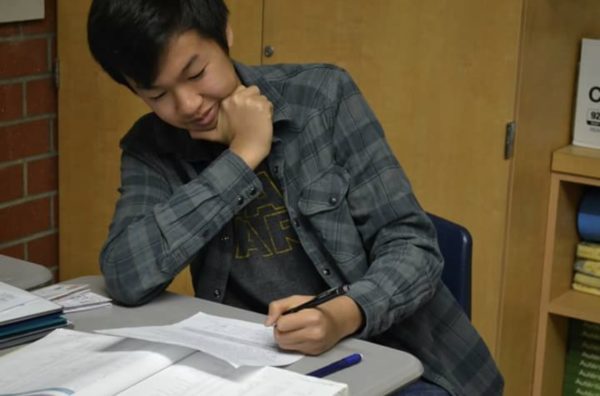
By Ella Scott-Wallace and Jennifer Trend, Staff Writers
At Fountain Valley High School, there are currently no honors or Advanced Placement (AP) 5 courses offered for the three languages available. Compared to English classes, which consist of four levels ranging of regular, honors and AP choices, the question of why world languages aren’t given more advanced classes emerges.
At this time, honors classes and a level 5 AP course for all languages isn’t a seriously discussed topic both district-level and site-level, so it’s unlikely this hypothetical question could become a reality in the near future.
The idea of adding honors courses is a complex topic, and wouldn’t be easy to simply implement them into the curriculum. Challenges would arise with staffing, sections and even scheduling. Adding a wider variety of options would potentially reduce the amount of regular sections of a language available depending on how many students wanted to take an honors class, overall making scheduling by guidance less flexible.
However, implementing a honors system would further immerse students into the language and culture, and would allow language classes to have weighted grades or have the score on the AP test be counted towards possible college credit. Honors and AP classes come with difficulties in balancing out classes- and with the population at Fountain Valley geared towards wanting to take more honors or APs, advanced language classes serve to be detrimental if taken with an impacted schedule.
“Some students take more than they can handle, and I think that’s affecting their social life,” said Saori Tanaka, Japanese teacher. “It’s affecting their mental health. They really need to know how much time they have to do all the assignments for each class and they definitely should be able to have some time be a high schooler.”
Honors could also possibly prohibit the amount of learning students are able to gain from one another. To a majority of students, the language they’re taking is completely new to them, and can oftentimes to be hard to fully grasp as it is. Ways of learning are different for each individual, so gaining knowledge and tips from their peers can be an efficient way to comprehend the material.
“Some students for whom a language is more difficult have those higher language models of the students who it comes easier for, and so they can learn from each other that way,” said Jim Diecidue, Spanish teacher and World Languages Department Coordinator. “If we had honors and another non-honors track, maybe some of the students who it might not come as easy to might not have the same high level students to learn from in that class.”
If honors courses were ever implemented, the basic function and placement criteria would most likely be similar to the way current honors classes in other departments work. It would be a separate class, rather than joint with a regular class, because that set up generally allows a teacher to focus in on that class and teach it differently than a non-honors course. As for placement, an honors or another AP course would possibly require a minimum grade cut off from the previous level.
Differentiating itself from a regular language class, an honors class would provide an even more challenging perspective to learning a new language, as well as further acquainting students with the culture.
“I think if we were to have an honors class, there would be probably more authentic text and listening, more challenging literacy activities for students at a higher level that might be particularly challenging for some of the students who might have difficulty learning a language,” said Diecidue. “So an honors course would just be more rigorous as far as the level of language used and the level of language that students would probably be expected to produce.”
Specifically in the Japanese and French perspective, honors classes would be very hard to implement given their already small population and difficult content.
If there was a Japanese honors class, it would most likely require extra education outside of class such as a weekend Japanese school or having family who students frequently speak to in Japanese.
“I’m assuming [these students] already speak the language at home but they only speak casual Japanese with their family. They don’t know formal speech style. So I would focus more on that and of course they usually don’t read or write at home, they only speak it. So reading and writing will have a strong emphasis,” said Tanaka.
This is all hypothetical of course, so don’t expect an additional AP 5 or honors class to be a possibility in the near future, but it is interesting to entertain the thought of what it would be like if they were an option.





